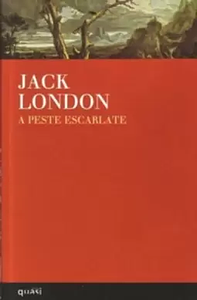You need to sign in or sign up before continuing.
Take a photo of a barcode or cover
medium-paced
Plot or Character Driven:
Plot
Strong character development:
No
Loveable characters:
No
Diverse cast of characters:
No
Flaws of characters a main focus:
No
“The human race is doomed to sink back farther and farther into the primitive night ere again it begins its bloody climb upward to civilization.”
I was surprised to have never heard about The Scarlet Plague until very recently. I read Call of the Wild and White Fang when I was quite young, and for some reason or another, this one slipped under my radar. It was a very, very quick read. Which in no way diminishes the story. This made a perfect "curl up on an cool day" book for me.
I was surprised to have never heard about The Scarlet Plague until very recently. I read Call of the Wild and White Fang when I was quite young, and for some reason or another, this one slipped under my radar. It was a very, very quick read. Which in no way diminishes the story. This made a perfect "curl up on an cool day" book for me.
adventurous
inspiring
sad
tense
fast-paced
Plot or Character Driven:
A mix
Strong character development:
Yes
Loveable characters:
Yes
Diverse cast of characters:
No
Flaws of characters a main focus:
Yes
While not among my favorite works by London, I can appreciate this as a significant work of early SF. I personally found the comparisons to this story and the COVID-19 pandemic a bit overstretched, although it is intriguing that this was written just a few years before the 1918 pandemic.
In this London, a writer who ought to be remembered more as a SF writer than he usually is, goes hard with his Social Darwinism (an ideological forerunner of eugenics, the ideas of which would influence far too much of SF literature after London) and while it would be easy to brush it aside as Eurocentric racism, it reveals London's deeper cynicism about humanity and human civilization and as a reader today, I find myself asking why someone in London's time would feel that way. It's an interesting inquiry to pursue, the kind of thing I read SF for, which might be the best reason for reading this today. The other element in this story that I found striking is London's sense of how fragile society and civilization really are, how easily things like the knowledge of science, crafts and skills can be lost and need to be rediscovered if we do not take care to preserve them, although London does not seem hopeful that such transmission of knowledge can be trusted to who he sees as society's "lessers." All in all, this is not an optimistic story, very contrary to how some people past and present think SF is or should be an inherently optimistic genre.
In this London, a writer who ought to be remembered more as a SF writer than he usually is, goes hard with his Social Darwinism (an ideological forerunner of eugenics, the ideas of which would influence far too much of SF literature after London) and while it would be easy to brush it aside as Eurocentric racism, it reveals London's deeper cynicism about humanity and human civilization and as a reader today, I find myself asking why someone in London's time would feel that way. It's an interesting inquiry to pursue, the kind of thing I read SF for, which might be the best reason for reading this today. The other element in this story that I found striking is London's sense of how fragile society and civilization really are, how easily things like the knowledge of science, crafts and skills can be lost and need to be rediscovered if we do not take care to preserve them, although London does not seem hopeful that such transmission of knowledge can be trusted to who he sees as society's "lessers." All in all, this is not an optimistic story, very contrary to how some people past and present think SF is or should be an inherently optimistic genre.
This book, which reads like many other post-apocalyptic novels, is mainly interesting for the fact it was published in 1912 (when such fiction was much more scarce) and for the fact that it’s from Jack London.
The story follows an old man, one of the remaining few who remember the world before it collapsed in the wake of a terrifying plague, as he desperately, fruitlessly tries to educate the next generation. This generational, ideological, conflict, rather than simply the challenge of survival, was also an interesting one. There’s something relatable and poignant about watching a man try to describe a different world, a wholly distinct and vanished age, to people who have no frame of reference for understanding it. The youngsters, our protagonists’ grandsons, think he’s full of nonsense and are only interested in hearing about earlier civilization insofar as it may assist them in their current, simplified lives, “I’m going to get Granser to remember this here gunpowder stuff,” Edwin said softly, “And then I’ll have you all on the run.”
Ultimately this was a pleasant, if too brief, read.
The story follows an old man, one of the remaining few who remember the world before it collapsed in the wake of a terrifying plague, as he desperately, fruitlessly tries to educate the next generation. This generational, ideological, conflict, rather than simply the challenge of survival, was also an interesting one. There’s something relatable and poignant about watching a man try to describe a different world, a wholly distinct and vanished age, to people who have no frame of reference for understanding it. The youngsters, our protagonists’ grandsons, think he’s full of nonsense and are only interested in hearing about earlier civilization insofar as it may assist them in their current, simplified lives, “I’m going to get Granser to remember this here gunpowder stuff,” Edwin said softly, “And then I’ll have you all on the run.”
Ultimately this was a pleasant, if too brief, read.
It is an extremely short book - but for its age it is still really compelling. And really quite spot on in some ways. Definitely an interesting concept.
I was scrolling through the science fiction section of LibriVox and found this gem. I had no idea Jack London had written a post-apocalyptic novella.
The book is set in San Francisco in the year 2073, roughly 60 years after the Scarlet Plague wipes out most of humanity. The main character, James Howard Smith (or Granser as he is called by his grandsons), was an English professor at Berkeley when the plague hit. The book contains little in the way of action or a plot. Most of narrative consists of Granser telling his three primitive, knuckle-dragging, mouth-breathing grandsons Edwin, Hoo-Hoo, and Hare-Lip about what life was like pre-plague and attempting to educate the knuckleheads with some basic science. In that way it reminded me of parts of Earth Abides. The grandsons have a hard time comprehending what he has to say and they absolutely do not buy anything he imparts to them about science. Additionally, they are mean to him and make him cry on occasion.
This was a quick read, and the tone is woebegone throughout. Check it out if for free via LibriVox if you are like me and enjoy this sort of fiction. 3.5 stars.
March 2023 update:
I reread this for the Apocalypse Whenever book club and I liked it better the second time. I think living through a pandemic makes one look differently at the world and realize that maybe the events of this book are more possible than we thought a few years ago. Plus, it reminds me of the excellent HBO series The Last of Us.
Granser's recollection of the fall of man makes this one.....dark stuff. London can tell a story.
The book is set in San Francisco in the year 2073, roughly 60 years after the Scarlet Plague wipes out most of humanity. The main character, James Howard Smith (or Granser as he is called by his grandsons), was an English professor at Berkeley when the plague hit. The book contains little in the way of action or a plot. Most of narrative consists of Granser telling his three primitive, knuckle-dragging, mouth-breathing grandsons Edwin, Hoo-Hoo, and Hare-Lip about what life was like pre-plague and attempting to educate the knuckleheads with some basic science. In that way it reminded me of parts of Earth Abides. The grandsons have a hard time comprehending what he has to say and they absolutely do not buy anything he imparts to them about science. Additionally, they are mean to him and make him cry on occasion.
This was a quick read, and the tone is woebegone throughout. Check it out if for free via LibriVox if you are like me and enjoy this sort of fiction. 3.5 stars.
March 2023 update:
I reread this for the Apocalypse Whenever book club and I liked it better the second time. I think living through a pandemic makes one look differently at the world and realize that maybe the events of this book are more possible than we thought a few years ago. Plus, it reminds me of the excellent HBO series The Last of Us.
Granser's recollection of the fall of man makes this one.....dark stuff. London can tell a story.
adventurous
dark
informative
reflective
sad
fast-paced
Plot or Character Driven:
Character
Strong character development:
No
Loveable characters:
Complicated
Diverse cast of characters:
Yes
Flaws of characters a main focus:
No
Bulaşıcı bir hastalığın çevresinde dönen bir kitap daha. Bu sene COVID-19'un da etkisiyle bu tür distopik kitaplar okumaya başladım.
Kızıl Veba'nın hikayesini bilmeyen olmadığı için direkt kendi değerlendirmeme geçiyorum.
Kitaptaki veba ürkütücü şiddette ve bulaşıcılıkta. COVID-19'un başında okumadığım için kendi omzumu sıvazladım, desem yeridir. Jack London'un futurist düşüncelerinin yerindeliği insanı daha da korkutuyor. Zeplinler kolaylıkla günümüz uçakları olarak değerlendirilebilir. COVID-19 başındaki laboratuvarlardaki doktorların gösterdiği cesaret örneğini bu kitaptaki doktorlar da yapıyor.
Hastalıktan dolayı çöken bir medeniyetin son şahidi tarafından anlatılan hikaye hem korkutucu hem de çok üzücü. Her ne kadar medeniyet bu kadar da gerileyemezdi, desem de bunun garantisi yok. Hele de söz konusu kızıl vebanın insanları öldürme oranı o kadar yüksekken.
Kitabı okurken beni rahatsız eden iki konu oldu: Kadınların mülkiyet olarak görülmesi ve medeni insan tanımı. Kitabın anlatıcısının medeni olarak değerlendirdiği insanlar çok beyaz, çok zengin, çok soylu ve çok eğitimli. Medeni olmadığını düşündükleri ise genelde esmer ve işçi sınıfından. Jack London hakkında okuduğum birkaç yazı sonucunda kendisinin "eugenist" olarak nitelendirilecek görüşleri savunduğunu öğrendim. Benim gibi Google'da arama yapmak istemiyorsanız, direkt Wikipedia sayfasını da ziyaret edip bunun hakkında okuyabilirsiniz. Kendisinin düşüncesi Brave New World'ün distopyasını destekler nitelikte olmasa ve bununla ilgili düşüncelerinde sonrasında değişmiş olsa da kitapta fark ediliyor. İlk başta anlatıcının çaresiz medeniliğini göstermek için bu şekilde yazılmış olabileceğini düşündüm; ama "eugenist" düşünceleri dikkate alındığı belki ilk baştaki değerlendirmem doğru olmayabilir. O yüzden bu düşüncemi de uyarı olarak düşünebilirsiniz.
Kadınlar ise dediğim gibi mülkiyet olarak görülüyor. "Güçlü" erkek en "iyi" kadını kapıyor, anlatıcı ise en "medeni" insanın kendisi gibi en "medeni" kadını kapmasını istiyor. Bu noktada sadece eugenist aynı zamanda "sexist" bir görüş de sayfalarda okuyorsunuz.
Son olarak, kitabın Türkçe çevirisini çok sevdim. Yayınevinin (çevirmenin?) eklediği dipnotlar, metnin akıcılığı çok çok iyiydi. Hem çevirmen Levent Cinemre hem de editör Barış Zeren'i tebrik eder aynı zamanda kendilerine teşekkür ederim. Orijinali İngilizce olup da Türkçesini okurken rahatsız olmadığım aksine çok keyif aldığım ender kitaplardan oldu.
Kızıl Veba'nın hikayesini bilmeyen olmadığı için direkt kendi değerlendirmeme geçiyorum.
Kitaptaki veba ürkütücü şiddette ve bulaşıcılıkta. COVID-19'un başında okumadığım için kendi omzumu sıvazladım, desem yeridir. Jack London'un futurist düşüncelerinin yerindeliği insanı daha da korkutuyor. Zeplinler kolaylıkla günümüz uçakları olarak değerlendirilebilir. COVID-19 başındaki laboratuvarlardaki doktorların gösterdiği cesaret örneğini bu kitaptaki doktorlar da yapıyor.
Hastalıktan dolayı çöken bir medeniyetin son şahidi tarafından anlatılan hikaye hem korkutucu hem de çok üzücü. Her ne kadar medeniyet bu kadar da gerileyemezdi, desem de bunun garantisi yok. Hele de söz konusu kızıl vebanın insanları öldürme oranı o kadar yüksekken.
Kitabı okurken beni rahatsız eden iki konu oldu: Kadınların mülkiyet olarak görülmesi ve medeni insan tanımı. Kitabın anlatıcısının medeni olarak değerlendirdiği insanlar çok beyaz, çok zengin, çok soylu ve çok eğitimli. Medeni olmadığını düşündükleri ise genelde esmer ve işçi sınıfından. Jack London hakkında okuduğum birkaç yazı sonucunda kendisinin "eugenist" olarak nitelendirilecek görüşleri savunduğunu öğrendim. Benim gibi Google'da arama yapmak istemiyorsanız, direkt Wikipedia sayfasını da ziyaret edip bunun hakkında okuyabilirsiniz. Kendisinin düşüncesi Brave New World'ün distopyasını destekler nitelikte olmasa ve bununla ilgili düşüncelerinde sonrasında değişmiş olsa da kitapta fark ediliyor. İlk başta anlatıcının çaresiz medeniliğini göstermek için bu şekilde yazılmış olabileceğini düşündüm; ama "eugenist" düşünceleri dikkate alındığı belki ilk baştaki değerlendirmem doğru olmayabilir. O yüzden bu düşüncemi de uyarı olarak düşünebilirsiniz.
Kadınlar ise dediğim gibi mülkiyet olarak görülüyor. "Güçlü" erkek en "iyi" kadını kapıyor, anlatıcı ise en "medeni" insanın kendisi gibi en "medeni" kadını kapmasını istiyor. Bu noktada sadece eugenist aynı zamanda "sexist" bir görüş de sayfalarda okuyorsunuz.
Son olarak, kitabın Türkçe çevirisini çok sevdim. Yayınevinin (çevirmenin?) eklediği dipnotlar, metnin akıcılığı çok çok iyiydi. Hem çevirmen Levent Cinemre hem de editör Barış Zeren'i tebrik eder aynı zamanda kendilerine teşekkür ederim. Orijinali İngilizce olup da Türkçesini okurken rahatsız olmadığım aksine çok keyif aldığım ender kitaplardan oldu.
medium-paced
Plot or Character Driven:
Plot
Simple et efficace. Ce récit change un peu de ce que j'ai pu lire de London, je n'ai pas vraiment retrouvé la plume que j'aime tant en général, mais c'est peut être la faute de la traduction. L'histoire reste bien écrite évidemment, bien menée, elle est très courte mais bien organisée, si bien qu'à la fin des 100 pages, rien ne reste en suspend, nous avons tout le nécessaire.
Son intrigue très accessible, sa plume simple et le format court de ce livre en fond une bonne lecture pour se remettre d'un gros bouquin, ou encore de ne pas céder à la panne de lecture.
Son intrigue très accessible, sa plume simple et le format court de ce livre en fond une bonne lecture pour se remettre d'un gros bouquin, ou encore de ne pas céder à la panne de lecture.






